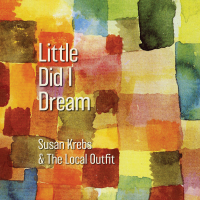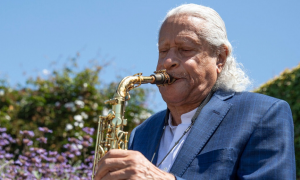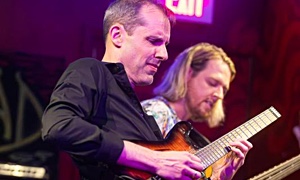Home » Jazz Articles » Interview » Greg Paul: We Can Share These Commonalities
Greg Paul: We Can Share These Commonalities
GP: It's funny, no one is really mentioning it (laughs), but it's interesting because all of the features so far that we have on this recording that we are working on, have been women. And it was unintentional at first. I mean it's still unintentional. There are parts where we collaborate with male artists. But it's a cool look to it—incorporate a different energy and insight.
AAJ: Are there any female instrumentalists?
GP: No, no instrumentalists. We have a female rapper as well. Her name is Noname, she is from Chicago. So yes, spoken word as well. I also work with Dawn Richard, she is from New Orleans, she is like electronic dance, she is also gonna be featured on the album. Now, we are looking forward to this—because up until now we are just all-instrumental, like no collabs. But that was unintentional too.
AAJ: One last question: What do you think about the term jazz? What do you associate with it?
GP: When I hear it or when I'm thinking of it personally it is an ever evolving entity, you know. It's like hip hop. When I think of hip hop it's just something that constantly grows... I think of improvisation, I really do think of the spirit of the people that came before—Duke Ellington, Coltrane, and Elvin Jones,

Roy Hargrove
trumpet1969 - 2018
AAJ: Maybe it's like this: when you say "This is jazz music," it's okay, because as a musician you know what you are talking about. But when somebody else who is not a musician—like me by the way—uses the term jazz, it starts to be difficult.
GP: Yeah—it's like you almost want to correct them. Like "No, it's music." Obviously it's music. But you almost want to see what their thinking on it, their approach is when they say it. It's like you want to ask them, "What do you mean by the word jazz?" And again, we're inspired by so many different things just rooted in jazz. I always say that, when somebody asks me to describe what kind of music we make. I say, "Well, it's rooted in jazz. It's growing from everything we have been inspired by." I was born in the late 1980s. So, it's hip hop, it's gospel because it's my upbringing, it's soul, it's world music, it's classical.
AAJ: Yeah, I see.
GP: And the drum set and jazz are pretty much the same age. The invention of the drum set came about around the same time as jazz. The kick drum pedal was invented in 1910, the drum set was born and then jazz—the drummer, it's almost mandatory here.
AAJ: Clarence Becton told me about a situation where he played in an orchestra. They featured

Dizzy Gillespie
trumpet1917 - 1993
GP: Oh yeah. The perception of what jazz should be—that's why I want to ask, 'What do you mean by jazz? How do you define that?' At the end of the day, everything has a name, like I call this a table.
AAJ: Yes, it gives kind of an orientation—knowing at least in rough outlines what you're talking about—when you're not a musician.
GP: Yeah. If you say "It's a jazz band," and if you'd just listen to it, I don't know if you'd associate it. How would you define Katalyst music?
AAJ: Me?
GP: Yes.
AAJ: I hear the jazz elements in it—or the roots of it, as you put it some minutes ago—and I hear the hip hop elements in it. And I have the impression it's not so much about soloing. There are solos, but I hear predominantly the dialogue or the polylogue. And to me it's a specific form of playing in a large ensemble. Sometimes it reminds me to some of

Makaya McCraven
drumsb.1983
GP: Yeah, right. I would agree. I really love polylogue, that term. That's exactly what it is—conversation, the group speaking to each other. We can coin that as a genre: polylogue music (laughs).
AAJ: Can you put "jazz" in words?
GP: You figure this word from the same thing—rebellion, like a declaration against the norm of what's going on, or what's happening to the people, that are creating the music. It's both—just a voice for the people, a vehicle of expression, to speak to that specific time. If the people that created hip hop were born in 1910—it would have been jazz, you know what I mean. And—to my uncle's (Clarence Becton) point: It's not about creating anything. We're just channeling what's already there. The first rappers, they have been doing the spoken word.

James Brown
vocals1933 - 2006
AAJ: And hip hop and jazz both come from the urban environment, the buildings, the streets, the traffic...
GP: But again, more so the oppression of it, of living in these spaces, being black in America and using that outlet. We have such a specific connection to the arts, I feel—as black Americans. When I was in London, there was a musician—and he was like: "Man, you as American musicians, you set the standard, the sounds that are setting the trend." But I don't think that's so much the case, that superiority. It's more so—people from the UK and all over the world—not people, black people specifically—we are like the first generation in UK, people of my age, maybe their parents, a lot of them can specifically identify the culture where they came from—like "My grandmother was from Nigeria" or whatever.
AAJ: Yeah, I see.
GP: For us, in America—because of the transatlantic trade I can say my family comes from Mississippi, this is as far back as I can go—the arts are our connection to that sense of home. We cling to it deeply—we just have to channel it, it's more of a spiritual [connection]. Not saying this is not in these other places. But we are constantly searching for it. For us it's the spirit that moves us.
AAJ: Kind of a universal language without reference to a certain nation, a certain material place. By the way—what you describe reminds me to Paul Gilroy's study The Black Atlantic (1993), especially what he elaborates in the chapter about black music.
GP: Yeah. Even within the Kats—we always marvel at our experiences, growing up in church—that was pretty 1000 miles away, but how did you have the same experience! It's so interesting. We can share these commonalities.
AAJ: Thank you very much.
Tags
Interview
Barbara Ina Frenz
Greg Paul
Clarence Becton
Leon "Ndugu" Chancler
Peter Erskine
Aaron Serfaty
Katalyst
Adrian Younge
Ali Shaheed Muhammad
Jazz is Dead
Roy Ayers
Gary Bartz
Lonnie Liston Smith
China Moses
Kamaal Williams
lee morgan
John Coltrane
John Scofield
Billy Higgins
McCoy Tyner
Elvin Jones
Wayne Shorter
Tony Williams
Weather Report
Michael Jackson
Thelonious Monk
Paul Jeffrey
Jacques Lesure
Brandon Cordoba
David Otis
Marlon Spears
Corbin Jones
Earth, Wind & Fire
duke ellington
Count Basie
The Beatles
Jonah Levine
Doug Carn
Henry Franklin
Jo?o Donato
The Beach Boys
Art Blakey
pat metheny
Herbie Hancock
Roy Hargrove
Dizzy Gillespie
Makaya McCraven
James Brown
Comments
PREVIOUS / NEXT
Support All About Jazz
 All About Jazz has been a pillar of jazz since 1995, championing it as an art form and, more importantly, supporting the musicians who make it. Our enduring commitment has made "AAJ" one of the most culturally important websites of its kind, read by hundreds of thousands of fans, musicians and industry figures every month.
All About Jazz has been a pillar of jazz since 1995, championing it as an art form and, more importantly, supporting the musicians who make it. Our enduring commitment has made "AAJ" one of the most culturally important websites of its kind, read by hundreds of thousands of fans, musicians and industry figures every month.






 Buy Now
Buy Now




















